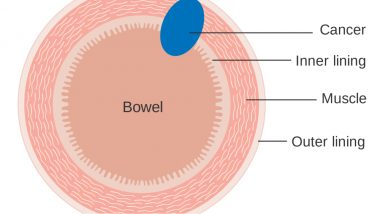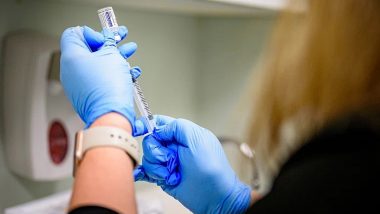Bowel Cancer Awareness month is celebrated in April. It is also known as colorectal cancer or colon cancer that affects the colon (large bowel) and rectum (back passage). Most bowel cancers begin as small, non-cancerous clumps of cells called adenomatous polyps on the wall of the bowel. Over a period, some of these polyps can become colon cancers. If left undetected the cancer cells will multiply to form a tumour in the bowel.
Hence, doctors recommend regular screening tests to help prevent colon cancer by identifying and removing polyps before they turn into cancer. It is therefore important to know the symptoms and causes of bowel cancer.
Causes
In most cases, doctors are unable told determine what causes colon cancer. However, when healthy cells in the colon develop errors in the DNA, it leads to colon cancer. When a cell’s DNA is damaged and becomes cancerous, cells continue to divide. As they accumulate, they form a tumour. The cancer cells continue to grow and invade and destroy normal tissue nearby.
- Inherited gene mutations: There are two rare conditions that occur in some families – FAP and HNPCC. Familial adenomatous polyposis (FAP) is a rare disorder that develop to thousands of polyps in the lining of your colon and rectum. Untreated FAP increases the risk of developing colon cancer before age 40. Hereditary non-polyposis colorectal cancer (HPNCC) or Lynch syndrome is characterised by a fault in the gene that helps DNA repair itself. Have Lynch syndrome increases the risk of developing bowel cancer and other cancers.
- Diet high in fat: Studies have shown an association between a typical western diet and an increased risk of colon cancer – it is high in fat and low in fibre. Low-fibre diet affects the microbes that live in the colon or causes underlying inflammation that may contribute to cancer risk. Hence, diet plays an important role.
- Bowel diseases: People who have an inflammatory bowel disease such as Crohn’s disease or ulcerative colitis, have a significantly increased risk.
- Lifestyle factors: Being obese, having a diet high in red meat, drinking alcohol and smoking too increase the risk.
- Age: The great majority of people diagnosed with colon cancer are older than 50.
Symptoms
In early stages, bowel cancer often has no symptoms. However, some people do experience persistent symptoms that include:
- A change in bowel habit such as diarrhoea and constipation.
- Unexplained weight loss, weakness or fatigue.
- Rectal bleeding or blood in stools.
- A lump in the rectum or anus.
- Persistent abdominal discomfort such as cramps, gas or pain.
Do not hesitate to make an appointment with your doctor if you face any of the above symptoms for more than four weeks. The earlier bowel cancer is caught, the easier it is to treat. 75% of bowel cancer is curable if caught early. People with an average risk of colon can consider screening beginning at age 50. But people with an increased risk such as those with a family history of colon cancer, should consider screening sooner.
(The above story first appeared on LatestLY on Apr 04, 2018 08:47 PM IST. For more news and updates on politics, world, sports, entertainment and lifestyle, log on to our website latestly.com).













 Quickly
Quickly




















